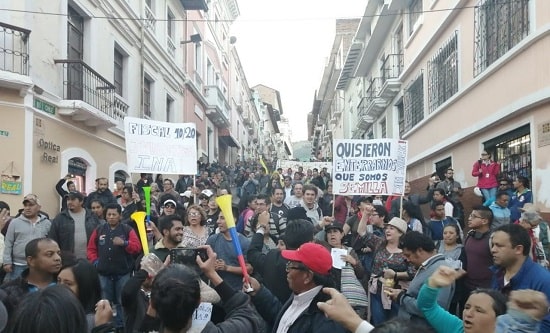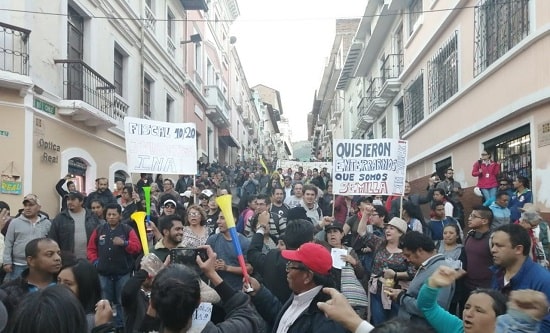
A five-day national strike in Ecuador beginning on 15 July saw tens of thousands of people take to the streets in opposition to neoliberal President Lenin Moreno. The strike was called by the National Campesino Movement (FECAOL) and workers’ unions against austerity measures tied to loans from the International Monetary Fund (IMF). Measures include cuts of $1,000m to the public sector, massive layoffs, privatisation of public services and a proposition from the private-sector to eliminate workers’ rights.
Moreno was elected as President in May 2017, taking over from the popular Rafael Correa after he had finished serving three terms from 2007. Both were representatives for the Alianza PAIS (AP) alliance, with Moreno serving as Vice President from 2007 to 2013.
Rafael Correa: the people’s President, 2006-2017
Correa founded the AP movement, a coalition of broad leftist and indigenous forces, in April 2006. This came a year after then President Lucio Gutierrez was ousted by Congress for replacing 27 of 31 Supreme Court judges with his allies in a bid to implement IMF-backed economic policies. Under his replacement, Alfredo Palacio, Correa was appointed as Finance Minister where he was an outspoken critic of the IMF and World Bank. When the World Bank withheld previously agreed loans in protest of economic reform policies imposed to help relieve poverty, Correa resigned his post. AP was born and, led by Correa, it won 56.7% of the vote in the October 2006 general election, against the right-wing populist Institutional Renewal Party of National Action.
AP under Correa sought to direct Ecuador towards ‘building socialism in the 21st century’ by the introduction of the Citizens’ Revolution. This came at a time when rejection of neoliberalism took hold in a ‘pink tide’ across Latin America. Based on Five Axes (of political revolution, social revolution, economic revolution, ethical revolution and the sovereignty revolution), the Citizens’ Revolution, backed by the mandate of the people, replaced the old, corrupt Ecuadorian Congress with a Constitutional Assembly.
The Assembly went on to draft a new constitution, endorsed by 64% of voters when put to a referendum in 2008. The Constitution, declaring Ecuador as ‘a territory of peace,’ created new rights for disabled people, women and indigenous people in line with Correa’s January 2007 inaugural address in which he announced ‘we will free our country from the atavisms and powerful national and international interests that dominate it; we will liberate the country with a clear preferential option for the poorest and marginalised, prioritising human beings above capital.’
As President, Correa increased public spending from 21% of GDP in 2006 to 44% in 2013. The number of people in extreme poverty fell from 20% in 2007 to 4% in 2017. Ecuador joined ALBA – the Alliance for the Peoples of Our America – founded by Cuba and Venezuela in 2004 to develop mutually beneficial trade and investment strategies between Latin American and Caribbean countries. Correa refused to sign agreements with the IMF, denouncing the ‘harmful’ organisation, and in 2008 told the US to vacate its military base in the Ecuadorian city of Manta, months before its lease expired.
Correa increased state spending on disability support from $2m a year in 2007 to $150m a year in 2013, guided by a 2009-2011 investigation into the state of disabled people conducted by 229 Cuban and 120 Ecuadorian medical specialists. Vice President Moreno worked with Cuba to found the Manuela Espejo Solidarity Mission for the Disabled, whose medical brigades visited 3,311,286 homes in 24 provinces across Ecuador, reaching the most remote parts of the country, and locating 294,611 people with disabilities while assisting 825,576 people with support. In February 2013, after acting as President while Correa ran for re-election, Moreno announced he was leaving politics, ‘Power comes with a stroke of fortune and you should quickly leave it behind. But while you are in that space, you must take advantage of it to realise your dearest ambition. For me, that was to promote the rights of the disabled. (…) I don’t enjoy being President. I don’t enjoy power.’
At the time, The Guardian reported rumours of his real reasons for stepping down, including a suggestion it was ‘because he has grown distant from Correa. There is even speculation that Moreno is planning to run for president in 2017’ (19 February 2013). As Correa neared the end of his three terms as President in late 2016, Moreno launched the election campaign he had reportedly been getting ready for almost four years. Evidently his strategists saw their best bet was running on a platform for the continuation of the policies of the Citizens’ Revolution. The BBC announced his win of 51% of votes with the headline ‘Socialist Lenin Moreno declared winner.’
Lenin Moreno’s deal with the devil
Since his election, Moreno has continuously betrayed the mandate he was elected on. He exceeded the new powers afforded to the reorganised Citizen Participation and Social Control Council in the February 2018 Referendum by using it to bypass the legislature and dismiss high public officials from the government, judicial council and National Electoral Council. His new administration then set about implementing a right-wing agenda involving tax cuts for the wealthiest and placing limitations on workers’ rights. Correa was forced into exile after his successor brought 14 criminal proceedings against him in 2017.
In seeking to realign Ecuador with the US, Moreno has pulled the country out of ALBA and in March agreed on a $10bn loan from organisations including the World Bank and IMF, the latter alone lending $4.2bn. This loan came with structural reform requirements forcing a programme of austerity to oversee cuts in jobs, welfare schemes and social spending, which has already resulted in the loss of at least 11,800 jobs for public sector employees, in large from the healthcare field. Given that Ecuador has positive GDP growth and that by the IMF’s own admission these policies will have a negative impact on economic growth, it is clear that accepting the loan was a purely ideological move on behalf of Moreno’s government to reverse the legacy of the Citizens’ Revolution and position Ecuador as a US ally.
The loan was also dependent on Ecuador changing its relationship with Wikileaks cofounder Julian Assange. In June 2018 US Vice President Mike Pence visited Moreno, becoming the most high-ranking US official in history to make a state visit to Ecuador, specifically to discuss Assange’s case. The US hoped to make an example of Assange for the 2010 Wikileaks exposé on US war crimes in Iraq, restricted only by his residency in the Ecuadorian Embassy in London where he had been seeking asylum from 2012 in order to resist extradition. Not long after Pence’s visit, the IMF approved the loans to Ecuador and within a couple of months Assange’s asylum was revoked. He is currently in Belmarsh Prison (see FRFI 270). Correa responded to the news of Assange’s arrest by denouncing Moreno as the ‘greatest traitor in Ecuadorian and Latin American history.’
A March 2019 poll by Perfiles de Opinion revealed that only 17% of citizens endorsed President Moreno. In April thousands of workers marched in opposition to his right-wing government and its deal with the IMF. Protestors carried banners and placards with slogans including ‘Out with Moreno, out with the traitor,’ ‘IMF + World Bank = terrorists,’ and ‘Free Assange.’ They were met with violence from riot police, who attacked demonstrators with batons and tear gas.
Despite the clear indication that the people are opposed to the new economic and foreign policies of the government, Moreno has continued to administer his reactionary strategy, repressing any who oppose him. In June his government invited the US to use the Galapagos Islands as an airfield for its air force and navy. At the same time, the Ecuadorian Government and IMF agreed on a second loan of $2.5 billion in exchange for further public spending and federal employment cuts. USAID, expelled by Correa in 2014 for attempting to destabilise the government through funding of right-wing opposition groups, were in August given a warm return. Much of the $30m in funds outlined in cooperation agreements between Ecuador and the humanitarian front group has been earmarked for ‘political projects’. The sharp turn to the right has given the Ecuadorian ruling class and business elite the confidence they need to try and push through measures aimed at eliminating workers’ rights.
Protestors on strike blocked roads and led chants against Moreno and the IMF. Joaquin Chiluisa, a union leader, told Telesur ‘We voted for Moreno to maintain social expenditure not to sign a deal with the IMF to the detriment of wellbeing…as workers, we reject the labor reform proposed by the banking and private sector.’ Mobilisations and demonstrations have not ceased, with more planned throughout September. We must stand in solidarity with the poor and working class Ecuadorians as they lead the fightback against imperialist attempts to dominate their economy through the IMF.
Ria Aibhilin




